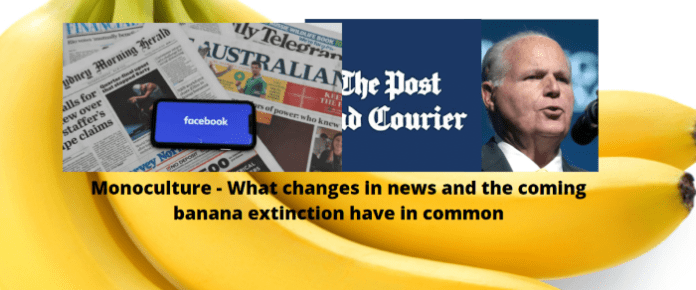In an unprecedented move, Facebook blocked all residents in Australia from sharing any news articles on its platform today. As CBS News reports: Facebook announced Thursday it has blocked Australians from viewing and sharing news on the platform because of proposed laws in the country to make digital giants pay for journalism. Australian publishers can continue to publish news content on Facebook, but links and posts can’t be viewed or shared by Australian audiences, the U.S.-based company said in a statement.
What do these things all have in common?: Big tech censorship, the death of Rush Limbaugh, a coming banana extinction, and a recent, local news item from the Charleston Post and Courier
MONOCULTURE
There’s a name for this situation: monoculture, the practice of fostering just one variety of something.
Monoculture has its benefits. The entire system is standard, so there are rarely new production and maintenance processes, and everything is compatible and familiar to users.
On the other hand, as banana farmers learned, in a monoculture, all instances are prone to the same set of weaknesses.
Monoculture has taken over media and the news industry. The industry is so sick that it may have no long term viability. Once the industry loses public trust, death will quickly follow for this cash starved concern.
According to PBS: By the year 2000, six corporations had ownership of most of the world’s media, and today five dominate the industry: Time Warner, Disney, Murdoch’s News Corporation, Bertelsmann of Germany and Viacom. These major corporations all own news components that report in lockstep.
Meanwhile, big tech recently showed its prowess as Amazon worked to shut Parler down. Parler was an emerging Twitter competitor. Twitter and Facebook truly have no competitors at the moment.
Ever since the introduction of Google Search in 1997, the worldwide market share of all search engines has been rather lopsided. Google has dominated the search engine market, maintaining an 92.47 percent market share as of January 2021.
IF THE SERVICES ARE FREE?
There is a saying in silicon valley. If the services are free, you are the product.
If we are the product, then monoculture may be the death to all things liberty and all things America.
Look at the Big Tech/Corporate media list again. Most every single outlet and platform is in league with the Democrat Party, as well as, bureaucratic systems of left centered, top down government.
As the independently owned Post and Courier reported this week, “Corruption festers when people aren’t looking, when the spotlight doesn’t shine. Without fair scrutiny, public officials with weak ethical backbones bend the rules. They help themselves to public money. They help their cronies instead of people they represent. Like a virus, corruption mushrooms, and so do the costs to you and other members of the public.“
THE COMING BANANA APOCALYPSE IS TELLING
Grown in more than 150 countries, it is widely believed there are more than 1,000 types of bananas in the world. However, consumers only eat one variety.
As Time Magazine reports, “The story of the coming banana extinction is really the story of modern agriculture exemplified in a single fruit,” says Daniel Bebber, who leads the BananEx research group at the University of Exeter.
Ninety-nine percent of exported bananas are from one variety called the Cavendish—the attractive, golden-yellow fruit seen in the supermarket today. This banana is only one of over 1,000 different banana plants that grow. However, it is the only variety sold to consumers.
But that wasn’t always the case. There are many varieties of banana in the world, and until the later half of the 19th century, the dominant one was called the Gros Michel. It was widely considered tastier than the Cavendish, and more difficult to bruise. But in the 1950s, the crop was swept by a strain of Panama disease, also known as banana wilt, brought on by the spread of a noxious, soil-inhabiting fungus. Desperate for a solution, the world’s banana farmers turned to the Cavendish. The Cavendish was resistant to the disease and fit other market needs: it could stay green for several weeks after being harvested (ideal for shipments to Europe), it had a high yield rate and it looked good in stores. Plus, multinational fruit companies had no other disease-resistant variety available that could be ready quickly for mass exportation.
To the people who pay attention to such things, it wasn’t long before a case of banana déjà vu set in: the Cavendish had supplanted the Gros Michel, but—even though it had initially been selected for being disease-resistant—it was still at risk.
Almost a decade ago, Dan Koeppel, author of Banana: The Fate of the Fruit That Changed the World, warned in an NPR interview that Panama Disease would return to the world’s largest banana exporters, and this time with a strain that would hit the Cavendish hard. “[Every] single banana scientist I spoke to—and that was quite a few—says it’s not an ‘if,’ it’s a ‘when,’ and 10 to 30 years,” he said. “It only takes a single clump of contaminated dirt, literally, to get this thing rampaging across entire continents.”
Sure enough, the confirmation of the presence of Tropical Race 4 (TR4), another strain of Panama disease, on banana farms in Colombia, prompted a 2019 declaration of emergency there.
“The situation is very urgent,” says Bebber. The Cavendish banana is projected to be extinct in a few, short years.
MONOCULTURE KILLS NEWS & NEWS COVERAGE
Says the Post and Courier: Internet competitors such as Google and Facebook stripped away advertising that long supported many newspapers. At the same time, cost-cutting corporate chains and hedge funds scooped up newspapers and axed reporting staffs to squeeze out more profits.
Roughly half of all journalism jobs disappeared during the past 15 years. “Ghost papers” are one result: organizations that don’t have enough journalists to dig deep into issues. And more than one-quarter of the nation’s newspapers vanished altogether.
DRIVE BY JOURNALISM
“Drive by journalism” produced by most local Horry County television stations occur because, in a cost cutting industry, such news is easy to report. A town government or county official hands out a press release. The T.V. station simply reads or prints it for the community. The news is hand picked and wordsmithed by a local bureaucrat. Questions are rarely asked.
Our local TV stations are owned by nationwide corporations that include: Nexstar Media Group – WBTW. NextStar owns 196 stations. Sinclair Broadcast Group, Inc – WPDE. Sinclair operates 294 television stations nationwide. Gray Television – WMBF News. Gray Television owns or operates 145 stations across the United States, based primarily in markets as large as Cleveland and as small as North Platte, Nebraska.
MYRTLE BEACH CHAMBER TAX MONIES TO MEDIA
Covid may change this equation in the future, however, over the past 10 years the Myrtle Beach Area Chamber of Commerce paid each of these local news outlets $1 million annually for “out of market” advertising. The independent Post and Courier, along with MyrtleBeachSC News, have never participated in these pay offs.
The tax funds come directly from a TDF tax collected by the City of Myrtle Beach. Apparently these cash starved corporate media bosses have yet to question any ethical issues in taking these millions.
VARIETY PROVIDES STRENGTH
It wasn’t always this way. Until the 1990’s, news outlets were primarily owned independently. Our local Sun News was owned and published right here in Myrtle Beach. Today McClatchy Corporation owns that paper. McClatchy has about 30 daily papers with a combined circulation of about 2.6 million. Its portfolio includes The Kansas City Star, The Miami Herald, The Charlotte Observer, The Sacramento Bee (California), and the Star-Telegram (Fort Worth, Texas)
ESTABLISHMENT ATTACKS THE FEW INDEPENDENTS WHO PROVIDE SUNLIGHT

Rush Limbaugh was one of the few independent voices in America. Upon his death, yesterday, Limbaugh was eviscerated by all things left, as well as, all things establishment America.
He attracted a cumulative weekly audience of 15.5 million listeners to become the most-listened-to radio show in the United States. He did so because he provided the counter balance to “cookie cutter”, corporate reporting.
VARIETY CREATES HEALTH
It is not in the best interests of politicians to pass laws that break up these high tech and news monopolies. Big loves Big. Big government loves big business. They are all but completely in bed with one another.
Americans must find a way to create variety for themselves. The system is broken and no one in government wants it fixed.
What news source we listen to and who we follow means everything. This holds true for good government, liberty, and also for the industry itself.
The industry and the U.S. government will go the way of the cavendish banana, should we continue on this current path.


